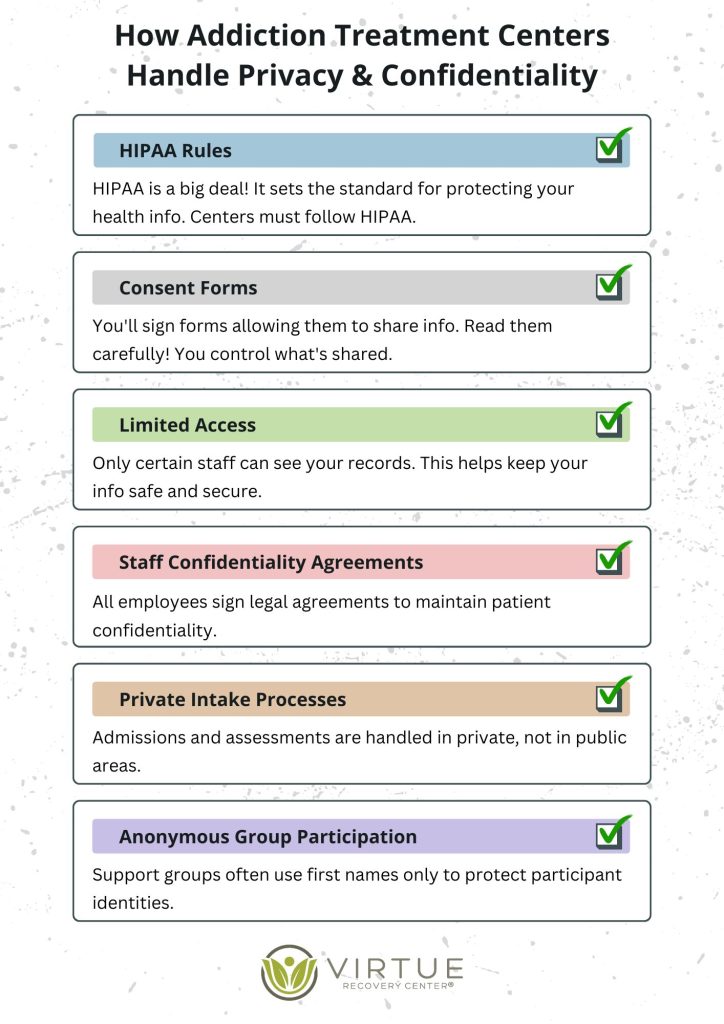Key Takeaways
-
Treatment centers must follow strict laws like HIPAA and 42 CFR Part 2.
-
Your personal health information is protected and only shared with your permission.
-
Staff members sign confidentiality agreements and receive special training.
-
Private assessments and anonymous group sessions help keep your identity safe.
-
You have the right to control who sees your treatment information.
Introduction
Deciding to get help for drug or alcohol addiction is a big step. But one thing that stops many people from seeking treatment is fear—fear that someone will find out. Maybe you worry about your job, your family, or your reputation.
The truth is, your privacy is protected. Treatment centers follow federal laws and use special systems to keep your personal information safe. In this article, we’ll explain how your privacy is handled from the moment you enter a rehab center.
Why Privacy Matters in Addiction Recovery
When people think about rehab, they sometimes imagine others finding out. Maybe you’re afraid of being judged. Or maybe you’ve heard stories about information being shared without permission.
These are valid concerns—but the law is on your side. Privacy isn’t just a courtesy in addiction treatment. It’s a legal requirement. Centers are held to high standards when it comes to keeping your details confidential.
HIPAA: The First Layer of Protection
HIPAA stands for the Health Insurance Portability and Accountability Act. It’s a federal law that helps protect your health information.
This law makes sure:
-
Your treatment details are private.
-
Your medical records stay secure.
-
Only people who need to know—like your doctor or counselor—can access your file.
HIPAA applies to all treatment centers and healthcare providers. It’s a rule everyone must follow.
What is 42 CFR Part 2?
There’s another law that offers even more privacy protection for people in addiction treatment. It’s called 42 CFR Part 2. This law is just for those being treated for substance use disorders.
Here’s what makes it extra strong:
-
It stops your treatment info from being shared, even with other doctors, unless you say it’s okay.
-
Even if someone asks for your info—like a lawyer or employer—it can’t be given out without your written permission.
42 CFR Part 2 is all about protecting people in recovery from stigma and harm.
Consent Forms: You’re In Control
Before anyone can share your information, you have to sign a consent form.
This form says:
-
What information can be shared.
-
Who can see it.
-
Why it’s being shared.
-
How long the consent lasts.
If you don’t want someone to know you’re in treatment, that’s your choice. The rehab center can’t share your info unless you agree.
Limited Access to Your Records
Not everyone at a treatment center can see your records. Only certain staff, like your counselor or medical provider, will have access. This system is called “limited access.”
It keeps your information:
-
Safe.
-
Secure.
-
Only available to people directly involved in your care.
This helps protect your privacy throughout your treatment journey.
Staff Confidentiality Agreements and Training
All staff members at a treatment center sign confidentiality agreements. These are legal documents that say they can’t talk about your care or share your records with others.
On top of that, staff members receive regular training. This helps them understand the laws and how to protect your privacy.
So when you enter treatment, you can feel confident knowing your information is in trusted hands.
Private Intake and Assessment Process
When you first enter a rehab center, you’ll go through an intake process. This includes filling out forms, answering questions, and getting assessed.
This process is done:
-
In a private room.
-
One-on-one with staff.
-
Away from public areas.
Everything you share is confidential, and your answers help create a treatment plan that’s just right for you.
Anonymous Participation in Group Therapy
Support groups are an important part of recovery. But what if you don’t want others to know your full name?
Many rehab centers have a simple solution: first names only.
Group sessions often:
-
Use first names or nicknames.
-
Remind everyone to respect privacy.
-
Encourage safe sharing without pressure.
It’s a supportive environment where your identity stays protected.
Infographic: How Addiction Treatment Centers Handle Privacy & Confidentiality
(Insert infographic image here titled “Addiction Treatment & Privacy”)
The infographic explains privacy protections like HIPAA rules, consent forms, limited access, and more. It shows how centers work hard to protect your personal health details.
Conclusion
Privacy matters. And at Virtue Recovery Center, protecting your confidentiality is one of our top priorities. From the first phone call to the final therapy session, your information is handled with care and respect.
Whether you’re worried about your job, family, or community finding out, rest assured—we’re here to help, not to judge.
If you or someone you love is ready to seek help, call Virtue Recovery Las Vegas today at 866-520-2861. Your recovery can begin with safety, trust, and total confidentiality.
How Does Schema Therapy Address Privacy and Confidentiality in Addiction Treatment?
Understanding schema therapy for addiction recovery emphasizes the importance of privacy and confidentiality. This therapeutic approach fosters a safe environment where individuals can explore their deepest issues without fear of judgment. By prioritizing confidentiality, schema therapy enables clients to confront their schemas and vulnerabilities, ultimately enhancing their recovery journey.









